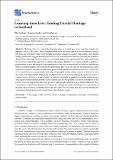Learning from loss : eroding coastal heritage in Scotland
Abstract
Heritage sites are constantly changing due to natural processes, and this change can happen fastest at the coast. Much legislation has been enacted to protect sites of historic interest, but these do not protect sites from natural processes. Change is already happening, and climate change predictions suggest that the pace will accelerate in the future. Instead of seeing the potential destruction of heritage sites as a disaster, we should embrace the opportunity that they can provide for us to learn about the past and to plan for the future. Heritage laws often enshrine a policy of preservation in situ, meaning that our most spectacular sites are preserved in a state of equilibrium, with a default position of no permitted intervention. However, the options for threatened coastal sites mirror those of shoreline management plans, which usually recommend either the construction of a coastal defence or, more likely, a strategy of managed retreat, where erosion is allowed to take its course after appropriate mitigations strategies have been enacted. Managed retreat can lead to a range of research projects, some of which would not normally be possible at similar, unthreatened and legally protected monuments. Such research also has the potential to involve members of the public, who can help in the discovery process, and cascade what they have learned through their communities. Information shared can be about the heritage site itself, including how communities in the past coped at times of climatic stress; and also about the processes that are now threatening the monument, thus helping teach about present day climate change.
Citation
Graham Allsop , E L , Dawson , T C & Hambly , J 2017 , ' Learning from loss : eroding coastal heritage in Scotland ' , Humanities , vol. 6 , no. 4 , 87 . https://doi.org/10.3390/h6040087
Publication
Humanities
Status
Peer reviewed
DOI
10.3390/h6040087ISSN
2076-0787Type
Journal article
Items in the St Andrews Research Repository are protected by copyright, with all rights reserved, unless otherwise indicated.

